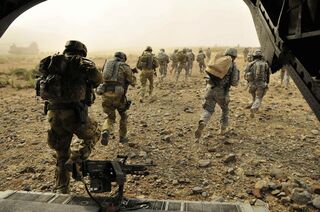This month is PTSD Awareness Month. I had planned a series of posts on stress reactions and their relationship to PTSD, with an emphasis on the military. However, recent events have necessarily refocused all of us, and I thought it would be good to alter the direction of the conversation somewhat.
There are currently concerns about the mental health of the entire nation, given the challenges that we are facing. Almost everyone is experiencing some kind of stress and anxiety: a conglomeration of the virus, high unemployment, extended periods at home without the physical social contact we are used to, ongoing wars, and now substantial civil unrest as a response to racism.

Service members know a lot about fear and anxiety. Military fundamentals include massive amounts of stress. However, service members also know that courage cannot exist without fear, and the best mental health outcomes don’t exist without the demonstration of courage (in whatever form that takes).
Further, what we fear is not always what people might expect. Service members getting ready to go into combat for the first time might be expected to fear death or injury. But the greatest fear service members have before their first combat situation is of being a coward, failing to perform at that critical moment, and letting themselves and their fellow service members down. In the military, fear of being a coward in a critical, life-defining moment is a stronger fear than death.
With that said, the country can very much be thought of as entering combat—against a deadly virus, against inequality, against a host of problems which have been magnified given current events. It is normal right now to be afraid, anxious, stressed, and emotionally exhausted. However, the issue is not that we are overstressed, worried, and afraid. This issue is how will we, as a nation, address these issues? And what as individuals will we do?
As every service member knows, fear is a motivator, and the only way to conquer it is to actively face it. Go into combat with your training, life experiences, and your cohesive unit and fight. This is not only the best way to support others, but it is also the best way to preserve and improve your own psychological health. Get and keep yourself in fighting shape, take action, and be courageous.
Now, obviously, I’m not talking about grabbing your firearm and charging into battle. Courage takes many forms. What will your courage look like? Will you express an unpopular opinion? Join the military? Become an EMT or law enforcement officer? Will you stand up for what you think is right when others may disagree or disapprove? Will you help another person? Will you listen to a person with a different opinion and try to see their perspective? Will you run for office? Will you examine your own biases? What will you do?
We are living in historic times. 2020 will be a year we will all remember. It looks to be a catalyst for massive societal changes and, hopefully, a vaccine. It will also be a year where you look back to see what challenges you faced personally and how you responded.
There are many who think that these events are going to cause long-lasting mental health problems for a large proportion of Americans. I believe that this country is more resilient than that. We know what to do to keep ourselves healthy and to help others.
It is a time to accept that we are all stressed (a normal response to an abnormal environment), but it is also a time to accept that we can all do something about it. Small things like wearing a mask to protect others, and bigger things like speaking out against injustice and changing beliefs and practices. It all counts. This is a time for us to come together, to think of others, to be courageous. It is time to transform our fears into courage and action. The long-term benefits to societal and personal health will become self-evident.
The views presented in this post are those of the author and do not reflect the official policy or position of the U.S. Navy, the Defense Health Agency, the Department of Defense, the U.S. Government, or any other institution with which the author is affiliated.


